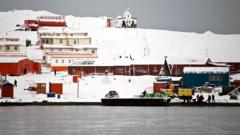In an unprecedented move, British police arrested four activists associated with the pro-Palestinian group Palestine Action, invoking counterterrorism laws normally reserved for more extreme threats. This legal action follows a demonstration at Brize Norton, the country's largest RAF base, where members used red paint to vandalize military aircraft. The government's commitment to potentially banning the group raises questions about freedom of expression and protest in the U.K.
**Pro-Palestinian Activists Face Terrorism Charges Following U.K. Air Force Base Incident**

**Pro-Palestinian Activists Face Terrorism Charges Following U.K. Air Force Base Incident**
Authorities deploy counterterrorism legislation against activists from Palestine Action amidst growing tensions.
In a rare application of counterterrorism legislation, the U.K. police arrested four individuals linked to the pro-Palestinian organization Palestine Action for a recent break-in at Brize Norton airbase. The arrests, carried out under a 2000 law typically used against serious violent extremists, involve a 29-year-old woman and two men aged 36 and 24, with a fourth woman, aged 41, arrested for aiding an offender. The activists were captured on video causing damage to military planes using red paint during an incursion on June 20.
Palestine Action, known for targeting facilities associated with Israeli military contractors, has stirred controversy with past acts, including vandalizing a Trump-owned golf resort. The rise of such legal measures against vandalism acts is a significant development, reflecting the current U.K. government's approach to dissent related to the Israeli-Palestinian conflict. The implications of these arrests may have far-reaching effects on protests and civil rights in the nation.
Palestine Action, known for targeting facilities associated with Israeli military contractors, has stirred controversy with past acts, including vandalizing a Trump-owned golf resort. The rise of such legal measures against vandalism acts is a significant development, reflecting the current U.K. government's approach to dissent related to the Israeli-Palestinian conflict. The implications of these arrests may have far-reaching effects on protests and civil rights in the nation.





















